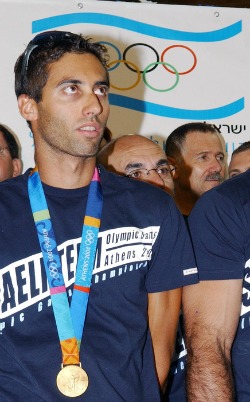“It’s a dream come true, it’s unbelievable that I’ve become the first Israeli to win a gold medal. I felt like the whole country was watching me and pushing me from behind,” said Olympic gold medal winner Gal Fridman at a press conference in Athens yesterday.
And the whole country was behind Fridman, as the 28-year old windsurfer captured the men’s Mistral title after finishing second in the final race on Wednesday.
“For us this is a dream come true, something we have been dreaming about since our first Olympics in 1952,” said Israeli team manager Gilad Lustig. “Gal Fridman is our greatest athlete. To see our flag displayed and hear our national anthem played at the awards ceremony is a moment we have long been waiting for.”
The Israeli national anthem sounded over an Olympic podium Wednesday for the first time in the Jewish state’s 56-year history. As the last notes sounded, exuberant Israelis mobbed the podium, embracing Fridman and snapping photographs of the gold medal draped around his neck.
“Every Olympics we dream of hearing the anthem and seeing the flag. It’s the top,” Fridman said, the victor’s wreath on his head. “I was feeling very proud and so happy to hear the people singing it. I sang as strong as I could, but nobody heard it because everybody was screaming.”
Israel entered the games in 1952, but its Olympic history is marked more by terrorist attacks and political demonstrations than by sports achievements and medals. At the 1972 Munich games, 11 athletes and coaches were killed by Palestinian terrorists.
Fridman promised to take his gold medal to the memorial in Tel Aviv for those killed in Munich, to “give respect for the people who were in front of me and killed while they tried to represent my country.”
Fridman’s father, Uri, has long been a fan of water sports. On Sept. 16, 1975, his first son was born, and he named him Gal, which means “wave” in Hebrew. To his second son, he gave the name Yuval — “creek” — and his daughter is Mayan — “spring.”
Gal Fridman began sailing at age 7, and soon his father was coaching him. He entered his first competition when he was only 11, and won a bronze medal at the 1996 Olympics in Atlanta.
But even for Fridman’s father and former coach, the gold-medal win felt unreal.
“It’s very, very hard to believe that he succeeded in doing this,” said Uri Fridman, who watched Wednesday’s race from the Fridman family house in central Israel. Soon after the finish, it was filled with cheering friends and relatives.
“It’s like the best thing that could happen,” said Eli Moskowitz, a 28-year-old gym teacher who traveled from Rehovot, Israel, to see the race. “In Israel we don’t have so many moments like this. Any reason is a good reason for celebration.”
Israel won its first medal in 1992, and had won one silver and three bronzes -including Fridman’s – before coming to Athens. It won another bronze in judo last week.
“We are all excited, all the people of Israel. I think also all of the Jewish people,” Israeli President Moshe Katsav told Army Radio.
Fridman, who won a bronze in 1996, was not selected for the Sydney Games and gave up the sport for two years before returning to win the world title in 2002.
“Thank you, thank you to all the nation of Israel,” Fridman told Army Radio.
Fridman finished the competition on 42 points, ahead of silver medalist Nikolaos Kaklamanakis of Greece (52 points) and bronze medalist Briton Nick Dempsey (53 points). Brazilian Ricardo Santos, who was leading the competition going into the last race, finished fourth overall.
“I knew from the start that without confidence, it is impossible to succeed,” Fridman said after the race. “I was very calm and focused. I always said that my objective is the gold. I went for it with all my strength; I believed in myself, and I did it. I want to thank everyone for the support and the energy they sent me.”














